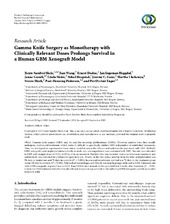Gamma knife surgery as monotherapy with clinically relevant doses prolongs survival in a Human GBM Xenograft Model
Skeie, Bente Sandvei; Wang, Jian; Dodoo, Ernest; Heggdal, Jan Ingemann; Grønli, Janne; Sleire, Linda; Bragstad, Sidsel Marit; Ganz, Jeremy Christopher; Chekenya, Martha; Mørk, Sverre; Pedersen, Paal-Henning; Enger, Per Øyvind
Peer reviewed, Journal article
Published version

Åpne
Permanent lenke
https://hdl.handle.net/1956/9781Utgivelsesdato
2013Metadata
Vis full innførselSamlinger
Originalversjon
https://doi.org/10.1155/2013/139674Sammendrag
Object. Gamma knife surgery (GKS) may be used for recurring glioblastomas (GBMs). However, patients have then usually undergone multimodal treatment, which makes it difficult to specifically validate GKS independent of established treatments. Thus, we developed an experimental brain tumor model to assess the efficacy and radiotoxicity associated with GKS. Methods. GBM xenografts were implanted intracerebrally in nude rats, and engraftment was confirmed with MRI. The rats were allocated to GKS, with margin doses of 12Gy or 18Gy, or to no treatment. Survival time was recorded, tumor sections were examined, and radiotoxicity was evaluated in a behavioral open field test. Results. In the first series, survival from the time of implantation was 96 days in treated rats and 72 days in controls (𝑃 < 0.001). In a second experiment, survival was 72 days in the treatment group versus 54 days in controls (𝑃 < 0.006). Polynuclear macrophages and fibrosis was seen in groups subjected to GKS. Untreated rats with GBM xenografts displayed less mobility than GKS-treated animals in the open field test 4 weeks after treatment (𝑃 = 0.04). Conclusion.GKS administered with clinically relevant doses prolongs survival in rats harboringGBMxenografts, and the associated toxicity is mild.
